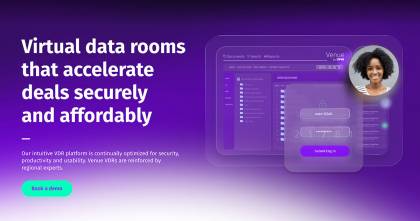While investor onboarding may not be top of mind for busy fund managers, it is critical for investors and for the success of the working relationship. A new generation of digital tools, including virtual data rooms, streamlines the onboarding process for mutual satisfaction. Explore key ways these digital tools make the investor onboarding process more efficient, with a focus on virtual data rooms or VDRs.
What Is Investor Onboarding?
Investor onboarding is the process of bringing new investors into an investment opportunity, such as a stock or fund. Typically, this requires collecting, organizing and securely storing personal and financial information to satisfy record-keeping regulations, as well as educating novice investors about the product they've selected. During the onboarding phase, data security and ease of access are top priorities.
Key Steps in the Investor Onboarding Process
Let's explore the key steps in the onboarding process, then examine how VDRs make the process more efficient while safeguarding security.
Typically, investor onboarding consists of three steps or phases.
1. Documentation and information-gathering
During this phase, the client reviews all the necessary contracts and agreements they must sign. They also review financial reports relevant to the investment vehicle, such as annual reports.
The wealth manager's job during this phase is to provide the client with the relevant information in a secure manner. They must also review for accuracy and file the completed client paperwork.
2. Introductions
Once the required paperwork is signed, the wealth manager introduces the investor to key personnel, such as executive leadership.
3. Overview of Company Performance
During the final phase of onboarding, the wealth manager provides the client with more information about the company's performance and financial projections for the future. This provides the background needed to better understand their investment and the potential upside.
The Role of Virtual Data Rooms in Investor Onboarding
Virtual data rooms are a type of corporate repository known for their safety and security. VDRs provide strict access control, so that sensitive financial documentation can be stored for client review.
A typical virtual data room provider, such as DFIN, will include the following features:
- Encryption, which encodes data during transmission for privacy
- Access controls, which ensure that only authorized individuals can access the VDR
- Activity tracking, which shows which documents have been accessed by which user, for transparency
- Bulk upload and folder organization, which make it easy to add new documents to the repository and keep everything organized
How to Streamline Investor Onboarding with VDRs
A VDR can be customized to reflect the needs of the type of transaction, whether it's a corporate transaction or investor facing. Let's look at how a VDR can streamline the investor onboarding process.
In a typical investor relations example, onboarding could consist of a 3-step process:
1. Organize the VDR by category, such as due diligence, financial reports, and contracts.
2. Set up access controls, so the investor only has access to material that is need-to-know based on their role.
3. Keep the repository up to date as new documents are made available, so investors always have access to the latest financial reports and documents.
Benefits of Using VDRs in Investor Onboarding
While a due diligence data room may be a more familiar concept than an onboarding data room, there are many benefits of choosing a VDR for onboarding investors.
Top benefits to keep in mind when you choose a VDR for this purpose include:
- Organizational Efficiency: Reduce lost or missing paperwork and stop hunting for files when all content is stored in a secure, centralized data room. The VDR also streamlines investor communication, enhancing efficiency in client communication.
- Transparency: Offering information in one central place reduces mistrust and promotes transparency by offering all information in one place, so an investor can review at their own pace.
- Global Access: VDRs offer anytime, anywhere access, supporting the needs of investors around the world.
- Investor Confidence: When the onboarding process is efficient, investors are likely to report more confidence and a better overall relationship with their wealth manager.
- Compliance: VDRs help wealth managers meet all regulatory requirements during the onboarding process.
Having a secure and efficient onboarding process builds trust and confidence with new investors, which is critical to client satisfaction and client retention. A secure onboarding process also streamlines operations, allowing wealth managers to handle the needs of different clients responsibly.
Investor onboarding portals differ in the features they offer. To fully realize the benefits of the VDR for investor onboarding, it is vital that you select a solution that meets your needs and supports not only your objectives, but the needs of your clients. Discover how DFIN's virtual data rooms protect privacy and security, improve transparency and streamline the process of client communication and onboarding.


